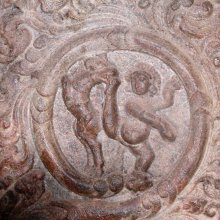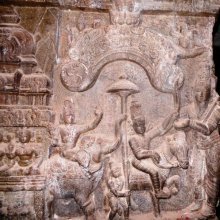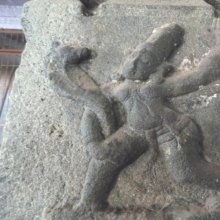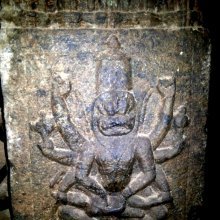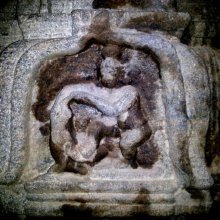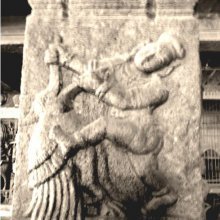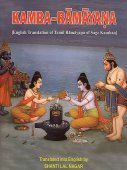Vadha, Vādha, Vādhā: 28 definitions
Introduction:
Vadha means something in Hinduism, Sanskrit, Jainism, Prakrit, Buddhism, Pali, the history of ancient India, Marathi, Hindi. If you want to know the exact meaning, history, etymology or English translation of this term then check out the descriptions on this page. Add your comment or reference to a book if you want to contribute to this summary article.
Images (photo gallery)
(+1 more images available)
In Hinduism
Purana and Itihasa (epic history)
Source: archive.org: Puranic EncyclopediaVadha (वध).—Son of Yātudhāna, a giant. It is mentioned in Brahmāṇḍa Purāṇa that this giant had two sons Vighna and Śama.
Source: archive.org: Shiva Purana - English TranslationVadha (वध) refers to “that which should be killed”, according to the Śivapurāṇa 2.4.6 (“The miraculous feat of Kārttikeya”).—Accordingly, as Kumāra (Kārttikeya) said to the Brahmin named Nārada: “O brahmin Nārada, this goat does not deserve to be killed (vadha-yogya). Return home. May your sacrifice be complete. It has been so ordained by my favour”.
Source: Cologne Digital Sanskrit Dictionaries: The Purana Index1a) Vadha (वध).—A Rākṣasa with the sun for 2 months— Śuci and Śukra; a son of Yātudhāna; and father of Vighna and Śamana.*
- * Brahmāṇḍa-purāṇa II. 23. 6; Vāyu-purāṇa 52. 8.
1b) Execution, as punishment for rape, illegitimate intercourse, doing mahāpātakams and theft.*
- * Matsya-purāṇa 227. 124, 141, 162 and 167.
1c) A Piśāca.*
- * Vāyu-purāṇa 69. 127.

The Purana (पुराण, purāṇas) refers to Sanskrit literature preserving ancient India’s vast cultural history, including historical legends, religious ceremonies, various arts and sciences. The eighteen mahapuranas total over 400,000 shlokas (metrical couplets) and date to at least several centuries BCE.
Natyashastra (theatrics and dramaturgy)
Source: Wisdom Library: Nāṭya-śāstraVadha (वध, “killing”) refers to one of the twenty-one sandhyantara, or “distinct characteristics of segments (sandhi)” according to the Nāṭyaśāstra chapter 21. The segments are divisions of the plot (itivṛtta or vastu) of a dramatic play (nāṭaka) and consist of sixty-four limbs, known collectively as the sandhyaṅga.
Source: Shodhganga: Literary estimate of mudraraksasaVadha (वध) refers to “killing” which should be avoided on a stage (where a dramatic play is performed).—A Nāṭaka should contain pañcasandhis which indicate five successive stages of the drama. This criterion also is present in the Mudrārākṣasa. [...] In the Sāhityadarpaṇa, Viśvanātha gives a list of certain actions which should not be presented on the stage. These are [e.g., killing (vadha)] [...].

Natyashastra (नाट्यशास्त्र, nāṭyaśāstra) refers to both the ancient Indian tradition (shastra) of performing arts, (natya—theatrics, drama, dance, music), as well as the name of a Sanskrit work dealing with these subjects. It also teaches the rules for composing Dramatic plays (nataka), construction and performance of Theater, and Poetic works (kavya).
Jyotisha (astronomy and astrology)
Source: Wisdom Library: Brihat Samhita by Varahamihira1) Vadha (वध) refers to “destruction”, according to the Bṛhatsaṃhitā (chapter 8), an encyclopedic Sanskrit work written by Varāhamihira mainly focusing on the science of ancient Indian astronomy astronomy (Jyotiṣa).—Accordingly, “If the disc of Jupiter should appear of the colour of fire, there will be fear from fire; if yellow, there will be disease in the land; if dark-blue, there will be wars; if green, suffering from thieves, and if of blood color, suffering from weapons. If the disc of Jupiter should appear of the colour of smoke, there will be drought; if it should be visible during day, rulers will perish [i.e., nṛpa-vadha] and if it should appear large and clear at night, mankind will be happy”.
2) Vadha (वध) refers to “(one who delights in) killing”, according to the Bṛhatsaṃhitā (chapter 15).—Accordingly, “[...] Those who are born on the lunar day of Ārdrā will delight in killing (vadha), torturing, lying, in adultery, thieving, cheating and tale-bearing; will deal in pod-grains, black magic, sorcery and exorcism. [...]”.

Jyotisha (ज्योतिष, jyotiṣa or jyotish) refers to ‘astronomy’ or “Vedic astrology” and represents the fifth of the six Vedangas (additional sciences to be studied along with the Vedas). Jyotisha concerns itself with the study and prediction of the movements of celestial bodies, in order to calculate the auspicious time for rituals and ceremonies.
Ganitashastra (Mathematics and Algebra)
Source: archive.org: Hindu MathematicsVadha (वध) or “killing” / “destroying” is another name for Guṇana (“multiplication”) which represents one of the twenty operations (logistics) of pāṭīgaṇita (“science of calculation which requires the use of writing material—the board”), according to Pṛthudakasvāmī’s commentary on the Brāhmasphuṭasiddhānta by Brahmagupta, a Sanskrit treatise on ancient Indian mathematics (gaṇita-śāstra) and astronomy from the 7th century.—The common Hindu name for multiplication is guṇana. This term appears to be the oldest as it occurs in Vedic literature. The terms hanana, vadha, kṣaya, etc. which mean “killing” or “destroying” have been also used for multiplication. These terms [e.g., vadha] came into use after the invention of the new method of multiplication with the decimal place-value numerals; for in the new method the figures of the multiplicand were successively rubbed out (destroyed) and in their places were written the figures of the product. Synonyms of hanana (killing) have been used by Āryabhaṭa I (499), Brahmagupta (628), Śrīdhara (c. 750) and later writers.

Ganitashastra (शिल्पशास्त्र, gaṇitaśāstra) refers to the ancient Indian science of mathematics, algebra, number theory, arithmetic, etc. Closely allied with astronomy, both were commonly taught and studied in universities, even since the 1st millennium BCE. Ganita-shastra also includes ritualistic math-books such as the Shulba-sutras.
Sports, Arts and Entertainment (wordly enjoyments)
Source: archive.org: Syainika Sastra of Rudradeva with English Translation (art)Vadha (वध) refers to the “slaughter (of animals)” (by hunters), according to the Śyainika-śāstra: a Sanskrit treatise dealing with the divisions and benefits of Hunting and Hawking, written by Rājā Rudradeva (or Candradeva) in possibly the 13th century.—Accordingly, “Hunting on horseback (āśvina) represents one of the eight subdivisions of Hunting (mṛgayā). [...] It leads to the acquisition of religious merit, by killing ferocious animals such as wolves and tigers, by the protection of standing crop, by the slaughter (vadha) of stags and other animals, by an inspection of the forest, which serves so many useful purposes, by frightening the thieves, and by conciliating forest tribes. [...]”.

This section covers the skills and profiencies of the Kalas (“performing arts”) and Shastras (“sciences”) involving ancient Indian traditions of sports, games, arts, entertainment, love-making and other means of wordly enjoyments. Traditionally these topics were dealt with in Sanskrit treatises explaing the philosophy and the justification of enjoying the pleasures of the senses.
In Jainism
General definition (in Jainism)
Source: Wisdom Library: JainismVadha (वध, “injury”) refers to “depriving one or many of the life forces (senses, strength or vigour, respiration or lifespan)” and is one of the causes leading to the influx (āsrana) of karmas extending unpleasant feelings (asātāvedanīya).
Vadha is a Sanskrit technical term defined in the Tattvārthasūtra (ancient authorative Jain scripture) from the 2nd century, which contains aphorisms dealing with philosophy and the nature of reality.
Source: archive.org: Jaina YogaVadha (वध) refers to one of the transgressions (aticāra) of the Ahiṃsā-vrata (vow of non-violence).—This vadha-aticāra has sometimes erroneously been rendered as ‘killing’. Haribhadra (in his commentary on the Āvaśyaka-sūtra) explains vadha as “thrashing with whips”. When occasion arises, says Siddhasena Gaṇin (in his commentary on the Tattvārtha-sūtra), a pious layman may administer a whipping to a person or animal in his charge with due consideration for age and avoiding any vital spot; pulling the ears or slapping is also permissible. The consensus of later opinion is perhaps best expressed by Devendra (in his Śrāddha-dina-kṛtya) when he says that it is merciless flogging that constitutes the aticāra. The Digambaras define vadha as “the beating of living creatures with rods, whips, or withies”.
Source: archive.org: TrisastisalakapurusacaritraVadha (वध, “injury”) refers to one of the hardships (parīṣaha), or “series of trials hard to endure” according to the Triṣaṣṭiśalākāpuruṣacaritra 10.1 (Incarnation as Nandana). While practicing penance for a lac of years, Muni Nandana also endured a series of trials hard to endure (e.g., vadha). Nandana is the name of a king as well as one of Mahāvīra’s previous births.
Source: Encyclopedia of Jainism: Tattvartha Sutra 7: The Five VowsVadha (वध, “beating”) refers to one of the five transgressions (aticara) of the “minor vow of non-violence” (ahiṃsā-aṇuvrata) according to the 2nd-century Tattvārthasūtra 7.25.—What is meant by beating (vadha)? To beat a living being with a whip, stick or cane to hurt (or to kill) is beating.

Jainism is an Indian religion of Dharma whose doctrine revolves around harmlessness (ahimsa) towards every living being. The two major branches (Digambara and Svetambara) of Jainism stimulate self-control (or, shramana, ‘self-reliance’) and spiritual development through a path of peace for the soul to progess to the ultimate goal.
India history and geography
Source: Cologne Digital Sanskrit Dictionaries: Indian Epigraphical GlossaryVādha.—(EI 16), land measure. Note: vādha is defined in the “Indian epigraphical glossary” as it can be found on ancient inscriptions commonly written in Sanskrit, Prakrit or Dravidian languages.
--- OR ---
Vādhā.—cf. bādhā. Note: vādhā is defined in the “Indian epigraphical glossary” as it can be found on ancient inscriptions commonly written in Sanskrit, Prakrit or Dravidian languages.

The history of India traces the identification of countries, villages, towns and other regions of India, as well as mythology, zoology, royal dynasties, rulers, tribes, local festivities and traditions and regional languages. Ancient India enjoyed religious freedom and encourages the path of Dharma, a concept common to Buddhism, Hinduism, and Jainism.
Languages of India and abroad
Pali-English dictionary
Source: BuddhaSasana: Concise Pali-English Dictionaryvadha : (m.) punishment, killing; execution.
Source: Sutta: The Pali Text Society's Pali-English DictionaryVadha, (fr. vadh) striking, killing; slaughter, destruction, execution D. III, 176; A. II, 113; Pug. 58; J. II, 347; Miln. 419 (°kata); DhA. I, 69 (pāṇa°+pāṇa-ghāta), 80, 296; DhA. II, 39; VbhA. 382.—vadhaṃ dadāti to flog J. IV, 382.—atta° self-destruction S. II, 241; piti° parricide DA. I, 153; miga° hunting J. I, 149.

Pali is the language of the Tipiṭaka, which is the sacred canon of Theravāda Buddhism and contains much of the Buddha’s speech. Closeley related to Sanskrit, both languages are used interchangeably between religions.
Marathi-English dictionary
Source: DDSA: The Molesworth Marathi and English Dictionaryvadha (वध).—m (S) Killing. 2 In arithmetic. Product. Note. Under the sense of Killing and answering to cide neat compounds are common, and others may be formed; as pitṛvadha, mātṛvadha, bhrātṛvadha, bhartṛ- vadha, manuṣyavadha, rājavadha, brahmavadha, gōvadha Patricide, matricide, fratricide, mariticide, homicide, regicide &c.
--- OR ---
vāḍha (वाढ).—f m (vṛddhi S) Growth; increase of stature and bulk; advance to maturity. 2 f Increase, augmentation, moreness of quantity: also the increment or increased quantity. 3 Surplus (of grain &c.) given in returning a quantity borrowed: also interest or usury more generally. 4 n f That part of a yam, potato &c. on which is the eye or source of the sprout. 5 n (Or vāḍhēṃ) The head of a sugarcane. vāḍhīsa lāgaṇēṃ To begin to grow. 2 To renew its growth;--used of a f̣œtus that has been stationary.
--- OR ---
vāḍhā (वाढा).—m (vāḍhaṇēṃ) Breed, brood, offspring, increase;--used esp. of that of cattle or beasts. Pr. vāghācā vāḍhā vāḍhata nāhīṃ The wicked do not prosper.
Source: DDSA: The Aryabhusan school dictionary, Marathi-Englishvadha (वध).—m Killing.
--- OR ---
vāḍha (वाढ).—f m Growth. f Increase. n The head of a sugar-cane.
--- OR ---
vāḍhā (वाढा).—m Breed, brood.
Marathi is an Indo-European language having over 70 million native speakers people in (predominantly) Maharashtra India. Marathi, like many other Indo-Aryan languages, evolved from early forms of Prakrit, which itself is a subset of Sanskrit, one of the most ancient languages of the world.
Sanskrit dictionary
Source: DDSA: The practical Sanskrit-English dictionaryVadha (वध).—1 Killing, murder, slaughter, destruction; आत्मनो वधमाहर्ता क्वासौ विहगतस्करः (ātmano vadhamāhartā kvāsau vihagataskaraḥ) V.5.1; मनुष्यवधः (manuṣyavadhaḥ) homicide; पशुवधः (paśuvadhaḥ) &c.
2) A blow, stroke; पुनरज्ञातचर्यायां कीचकेन पदा वधम् (punarajñātacaryāyāṃ kīcakena padā vadham) Mahābhārata (Bombay) 12.16.21; Manusmṛti 8.267.
3) Paralysis.
4) Disappearance.
5) Multiplication (in math.).
6) A killer, slayer.
7) A vanquisher, victor.
8) Ved. A deadly weapon, such as Indra's thunderbolt.
9) (In law) A capital or corporal punishment.
1) Frustration.
11) Defect, imperfection.
12) (In alg.) A product.
Derivable forms: vadhaḥ (वधः).
--- OR ---
Vāḍha (वाढ).—See बाढ (bāḍha).
--- OR ---
Vādha (वाध) or Vādhā (वाधा).—See वाध्, बाध, बाधक, बाधन-ना, बाधा (vādh, bādha, bādhaka, bādhana-nā, bādhā).
See also (synonyms): vādh, vādhaka, vādhana.
Source: Cologne Digital Sanskrit Dictionaries: Shabda-Sagara Sanskrit-English DictionaryVāḍha (वाढ).—mfn.
(-ḍhaḥ-ḍhā-ḍhaṃ) 1. Much, abundant, exceeding. 2. Hard, firm. Adv. n. or Ind.
(-ḍhaṃ) 1. Much, excessive, excessively. 2. Very well, well, (assent, promise.) 3. A particle signifying conclusion, deduction. E. vah to take, to bear, aff. kta; form. irr.
--- OR ---
Vādha (वाध).—m.
(-dhaḥ) 1. Pain. 2. Annoyance: see bādha .
Source: Cologne Digital Sanskrit Dictionaries: Benfey Sanskrit-English DictionaryVadha (वध).—[vadh + a] (also badha badha, probably better) m. 1. Killing, [Mānavadharmaśāstra] 5, 89; murder, [Pañcatantra] i. [distich] 305. 2. Death, [Mānavadharmaśāstra] 8, 104. 3. Corporal punishment, [Mānavadharmaśāstra] 9, 291. 4. A stroke, 11, 100. 5. A whip, 8, 267. 6. Hurting, [Mānavadharmaśāstra] 4, 165. 7. A killer, a slaughterer, [Mānavadharmaśāstra] 5, 39.
--- OR ---
Vāḍha (वाढ).— (cf. vahala and bahu), I. adj., comparat. sādhīyaṃs, superl. sādhiṣṭha. 1. Hard, firm; sādhīyaṃs, firmest, [Daśakumāracarita] in
Vadha (वध).—[masculine] slayer, murderer, destroyer; deadly weapon, [especially] Indra's thunderbolt; capital or corporal punishment; place of execution; stroke, blow, hurt, injury, destruction, death.
Source: Cologne Digital Sanskrit Dictionaries: Monier-Williams Sanskrit-English Dictionary1) Vadha (वध):—[from vadh] m. one who kills, a slayer, vanquisher, destroyer, [Ṛg-veda; Vājasaneyi-saṃhitā; Taittirīya-saṃhitā; Śatapatha-brāhmaṇa]
2) [v.s. ...] a deadly weapon ([especially] Indra’s thunderbolt), [Ṛg-veda; Aitareya-brāhmaṇa; Śāṅkhāyana-gṛhya-sūtra]
3) [v.s. ...] the act of striking or killing, slaughter, murder, death, destruction, [Ṛg-veda] etc. etc.
4) [v.s. ...] (in law) capital or (more commonly) corporal punishment, [Manu-smṛti; Yājñavalkya] etc. = vadha-bhūmi, place of execution, [Caurapañcāśikā, [Introduction]]
5) [v.s. ...] stroke, hurt, injury, [Nirukta, by Yāska]
6) [v.s. ...] paralysis, [Suśruta]
7) [v.s. ...] annihilation, disappearance (of inanimate things), [Mahābhārata; Kāvya literature] etc.
8) [v.s. ...] frustration, prevention, [Gautama-dharma-śāstra]
9) [v.s. ...] a defect, imperfection (28 are enumerated), [Viṣṇu-purāṇa]
10) [v.s. ...] multiplication, [Gaṇitādhyāya]
11) [v.s. ...] a product, [Bījagaṇita]
12) [v.s. ...] Name of a Rākṣasa, [Viṣṇu-purāṇa]
13) Vadhā (वधा):—[from vadha > vadh] a f. a kind of pot-herb, Convolvulus Repens, [cf. Lexicographers, esp. such as amarasiṃha, halāyudha, hemacandra, etc.]
14) b ind. [gana] cādi.
15) Vāḍha (वाढ):—See bāḍha.
Source: Cologne Digital Sanskrit Dictionaries: Yates Sanskrit-English DictionaryVāḍha (वाढ):—[(ḍhaḥ-ḍhā-ḍhaṃ) a.] Much; firm. adv. Much; very well; of course.
Source: DDSA: Paia-sadda-mahannavo; a comprehensive Prakrit Hindi dictionary (S)Vadha (वध) in the Sanskrit language is related to the Prakrit word: Vaha.
[Sanskrit to German]
Sanskrit, also spelled संस्कृतम् (saṃskṛtam), is an ancient language of India commonly seen as the grandmother of the Indo-European language family (even English!). Closely allied with Prakrit and Pali, Sanskrit is more exhaustive in both grammar and terms and has the most extensive collection of literature in the world, greatly surpassing its sister-languages Greek and Latin.
Hindi dictionary
Source: DDSA: A practical Hindi-English dictionaryVadha (वध) [Also spelled vadh]:—(nm) killing, murder; ~[jīvī] a slaughterer; ~[sthala/sthalī] a place of slaughter.
...
Kannada-English dictionary
Source: Alar: Kannada-English corpusVadha (ವಧ):—[noun] the act of killing (a person or animal).
Kannada is a Dravidian language (as opposed to the Indo-European language family) mainly spoken in the southwestern region of India.
See also (Relevant definitions)
Starts with (+123): Vadartha, Vadha Alopa Sahasakara Sutta, Vadhabandha, Vadhabandhana, Vadhabhumi, Vadhadanda, Vadhadha, Vadhadivasa, Vadhagamakapasana, Vadhaishin, Vadhajivin, Vadhaka, Vadhakama, Vadhakamya, Vadhakankshin, Vadhakapurusha, Vadhakara, Vadhakarmadhikarin, Vadhaki, Vadhakshama.
Ends with (+137): Abhyavadha, Agnivadha, Agrevadha, Amvadha, Anushvadha, Anvadha, Anvavadha, Aragvadha, Argvadha, Arhadvadha, Aruvata, Asavadha, Ashtasavadha, Asuravadha, Atmavadha, Attavadha, Avadha, Avashavadha, Avyavadha, Baheravadha.
Full-text (+1942): Vaha, Avadha, Vadhas, Vadh, Vadasa, Sadhishtha, Vadhar, Vadhabhumi, Badha, Brahmanavadha, Samvadha, Upamshuvadha, Kamsavadha, Diryatavadha, Sarva-vadha-vivarjita, Vadhopaya, Shishupalavadha, Mushtivadha, Sasthivadha, Vadhaka.
Relevant text
Search found 46 books and stories containing Vadha, Vāḍha, Vāḍhā, Vādha, Vādhā, Vadhā, Vaḍha, Vaadha; (plurals include: Vadhas, Vāḍhas, Vāḍhās, Vādhas, Vādhās, Vadhās, Vaḍhas, Vaadhas). You can also click to the full overview containing English textual excerpts. Below are direct links for the most relevant articles:
Rig Veda (translation and commentary) (by H. H. Wilson)
Garga Samhita (English) (by Danavir Goswami)
Verse 5.24.106 < [Chapter 24 - The Killing of the Kola Demon]
Verse 5.7.1 < [Chapter 7 - The Killing of Kuvalayāpīḍa]
Verse 5.14.42 < [Chapter 14 - The Meeting of King Nanda and Uddhava]
Manusmriti with the Commentary of Medhatithi (by Ganganatha Jha)
Verse 8.320 < [Section XLIII - Theft (steya)]
Verse 8.364 < [Section XLVI - Adultery]
Verse 8.381 < [Section XLVI - Adultery]
A History of Indian Philosophy Volume 3 (by Surendranath Dasgupta)
Chapter XXIII - Philosophical Speculations of Some of the Selected Purāṇas
Part 15 - Dialectical criticism against the Śaṅkara School < [Chapter XX - Philosophy of the Rāmānuja School of Thought]
The backdrop of the Srikanthacarita and the Mankhakosa (by Dhrubajit Sarma)
Part 5ad - Alaṃkāra (30): Vyāghāta or frustration < [Chapter III - Literary Assessment Of The Śrīkaṇṭhacarita]
Chaitanya Bhagavata (by Bhumipati Dāsa)
Verse 3.2.259 < [Chapter 2 - Description of the Lord’s Travel Through Bhuvaneśvara and Other Placesto Jagannātha Purī]
Verse 2.22.26 < [Chapter 22 - Delivering Śacīdevī from Offense and Descriptions of Nityānanda’s Qualities]
Verse 2.19.26 < [Chapter 19 - The Lord’s Pastimes in Advaita’s House]
Related products
